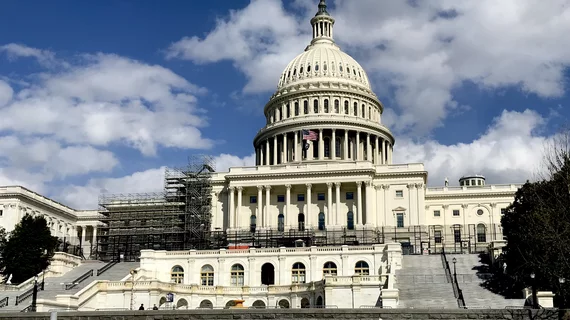Cardiologists support new bill that would improve AED access among students
The American College of Cardiology (ACC) and American Heart Association (AHA) have thrown their support behind new bipartisan legislation designed to improve automated external defibrillator (AED) access and increase CPR training in U.S. schools.
The Access to AEDS Act was introduced to Congress on March 29 by Reps. Sheila Cherfilus-McCormick and Bill Posey and Sen. Cory Booker. The bill, if passed, would lead to the development of a federal grant program that purchases, maintains and provides training for AEDs that can be placed in elementary and secondary schools throughout the United States. The bill also urges schools to create their own screening programs for athletes, which would be designed based on ACC and AHA recommendations.
Damar Hamlin, the Buffalo Bills safety who went into sudden cardiac arrest in the middle of a game back in January, appeared at Capitol Hill with Cherfilus-McCormick and Posey to promote the new legislation.
“Sudden cardiac arrest happens to more than 7,000 kids under the age of 18 every year in our country—7,000 kids every year,” Hamlin said, as quoted by CNN. “The majority of the kids impacted are student athletes, and research shows that one in every 300 youth has an undetected heart condition that puts them at risk. For schools that have AEDs, the survival rate for the children from sudden cardiac arrest is seven times higher.”
American College of Cardiology, American Heart Association show their support
The ACC and AHA have both emphasized the importance of this legislation since it was introduced to Congress.
“Damar Hamlin’s sudden cardiac arrest earlier this year shocked our nation and demonstrated in no uncertain terms the importance of automated external defibrillators and an emergency action plan,” ACC Chief Medical Officer Richard Kovacs, MD, said in a prepared statement. “The Access to AEDs Act is critical legislation that will help elementary and secondary schools save lives by helping communities purchase and maintain AEDs, provide CPR and AED training and develop cardiac emergency response plans like the one used by the NFL to save Hamlin’s life.”
Additional resources from the ACC focused on this topic are available here.
“We greatly appreciate Reps. Cherfilus-McCormick and Posey for their work to prioritize heart health with the introduction of the Access to AEDs Act, which will promote access to defibrillation in elementary and secondary schools by supporting lifesaving training programs for students, staff and school volunteers,” AHA CEO Nancy Brown said in a separate statement.
The AHA has been working closely with Hamlin since he recovered, collaborating with him to develop the #3forHeart CPR Challenge.

